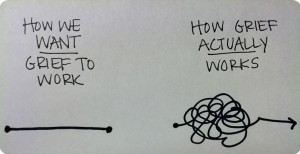The Grief Process: Coping with the Loss of a Loved One
When faced with huge loss, such as a relative or a pet, we as humans will experience a plethora of emotions, emotions some of us may not understand, or know how to deal with. But we shouldn’t be left in the dark during this sensitive time. We deserve to know what we are thinking, and how to get through it.
The 5 Stages of Grief
After a loss, you go through what is known as the Grieving Process. It consists of 5 different stages of emotions, all of which are necessary to heal.
– The first is Denial. In this stage, you’ll feel shock and confusion. It may be hard for you to continue your normal daily activities while you process your loss. You may initially suppress your feelings during denial, but that suppression will start to fade along with the denial.
– Next is Anger. You’ll likely start lashing out in rage at others, such as those who try to comfort you, or someone who was responsible for your loved one, such as a veterinarian or a caretaker, claiming that they didn’t protect them to the best of their abilities.
– The third stage is Bargaining. Those in mourning may seem willing to do anything they can, as long as they can bring those they love back. You may say things such as, “I’ll give up alcohol forever, just give me my wife back,” or “Maybe if I commit myself to doing good deeds, I’ll see my dog again.” You may start bargaining to a higher power as a way to quench your sadness.
– The penultimate stage, Depression, is likely the most trialing stage. You’ll feel empty, alone, and you may question why you continue living at all. But remember that this stage of depression is not a sign of mental illness, and is completely natural after a loss of a loved one. It is necessary in order to completely move on from grief.
– Finally, there’s Acceptance. This stage is what comes after you’ve come to terms with your loss, and moved on. Note that coming to terms does not mean you’ve forgotten your loss, or that you’re the same as you were before. In many ways, you’ll never be the same person after a big loss. Acceptance is what you feel when you’ve not only come to terms with your loss, but your changed life afterwards as well.
Important Tips

When coping with your loss, you may find it difficult to heal. Here’s some tips about the grieving process. Remember, everyone has a different method of grieving. These tips are not 100% guaranteed to apply to you.
1. You shouldn’t attempt to ignore your pain by preventing yourself from crying. Crying during grief is natural, and not a sign of weakness. It’s unhealthy both mentally and physically to suppress tears.
2. That doesn’t mean you aren’t grieving if you don’t cry. Just as I’ve said before, everyone will grieve differently. Someone who doesn’t cry can still be just as sad as anyone else, they just have a different way of showing it.
3. There is no “right amount of time” for the grieving process to happen. It could last only a week, or it could last years. Everyone has their own pace.
4. It’s helpful to surround yourself with loved ones to help you. You shouldn’t try to stay self-sufficient and strong willed in the face of loss. Instead, accept the help of others. It’s healthier for you.
5. If you follow any religious faith, you should take time to seek out comfort from fellow faith members. Praying or going to church can help you along.
6. Remember to take care of yourself. You may take solace in exercise, and the feeling of doing something productive. This is not limited to physical activity either. Perhaps you may enjoy painting or crafting something. You should remember to continue doing what you enjoy.
7. Try to speak with a therapist or school counselor if you can. They know just what to do when someone is struggling with grief.
When dealing with grief, remember that you shouldn’t be alone. It’s a sensitive time, and you’ll need support. Bear in mind these small tips, as they may help you finally come at peace with your loss.
Works Cited
Kessler, David. “The Five Stages Of Grief.” n.d. www.grief.com. Web. 28 January 2016.
Smith, Melinda and Jeanne Segal. “Coping with Grief and Loss.” January 2016. www.helpguide.org. Web. 28 January 2016.

